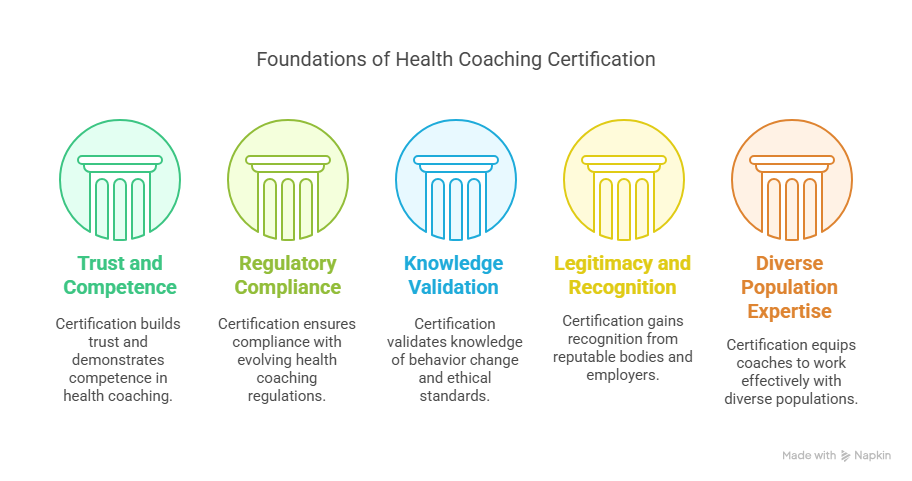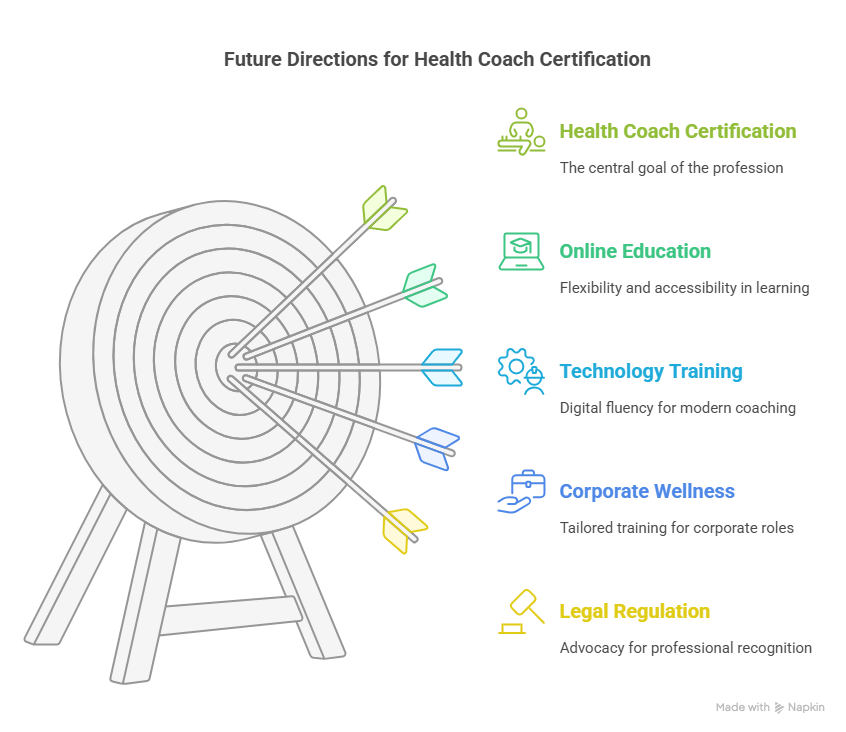Wellness Warriors Unite: Health Coach Certification Trends
The landscape of health coaching continues to evolve, fueled by the global demand for holistic well-being and the need for certified professionals. As we step into 2025, Health Coach Certification Trends are shaping the future of wellness careers, opening doors for individuals ready to inspire healthy, lasting change in others.
This blog will take you deep into the world of certification — highlighting key trends, challenges, opportunities, and expert guidance to help you choose the right program and thrive as a health coach.
The Growing Demand for Certified Health Coaches
The demand for certified health coaches in 2025 is higher than ever. As chronic diseases, mental health issues, and preventable lifestyle-related conditions continue to rise, the wellness industry is expanding to bridge the gap between conventional medicine and everyday lifestyle transformation.
Certified health coaches are becoming integral members of healthcare and wellness teams. They empower individuals through personalized support, goal-setting, and strategic habit change. From nutrition and fitness to stress management and sleep improvement, they bring a human-centered approach to health.
Whether working independently, within clinics, or in corporate wellness programs, certified health coaches are now considered essential professionals in promoting preventive care.
Why Certification Is Essential in 2025
Certification is more than a title — it represents trust, competence, and commitment. In 2025, health coaching is becoming more regulated, with clients and healthcare organizations demanding proven credentials. Certification validates a coach’s knowledge of behavior change theory, evidence-based practices, and ethical coaching standards.
Programs recognized by reputable bodies such as NBHWC (National Board for Health and Wellness Coaching) or approved by international organizations offer legitimacy. Many employers, wellness startups, and medical institutions now require certification as a baseline for hiring health coaches.
Additionally, certified coaches are better equipped to work across diverse populations and deliver results that stand up to scrutiny in both healthcare and wellness settings.
Health Coach Certification Trends in 2025
As the field matures, several emerging trends are shaping health coach certification programs. Here’s a deep dive into the most influential ones this year:
1. Tech-Integrated Learning and Coaching
2025 has seen a major leap in integrating technology into both learning and practice. Certification programs now incorporate platforms like AI-powered coaching simulations, virtual reality (VR) role-plays, and wearable data analytics. These tools train coaches to interpret real-time biometrics and behavior patterns, enhancing client results.
Programs also teach coaches how to use digital coaching apps, remote monitoring tools, and HIPAA-compliant video conferencing platforms to deliver care across geographies.
2. Specialized Coaching Tracks
To address increasingly personalized health needs, more certification programs are offering niche specializations. From hormone health and metabolic syndrome to trauma-informed coaching and adolescent wellness, these tracks give coaches a competitive edge and deeper impact.
In 2025, mental wellness coaching, sleep coaching, and autoimmune disorder coaching are especially in demand.
3. Evidence-Based Holistic Curriculum
Modern programs no longer separate science from soul. Updated curricula fuse behavior change psychology, nutritional science, exercise physiology, and holistic healing modalities — including meditation, somatics, and energy work.
This integrative health coaching approach ensures that coaches can address physical, mental, emotional, and spiritual dimensions of well-being — a must for today’s clients.
4. Global Certification Standards
Efforts to standardize health coach certification globally have gained momentum in 2025. Several international coalitions now work to align curriculum benchmarks, ethics codes, and continuing education requirements.
This opens the door for certified health coaches to practice internationally and makes their credentials more portable and recognized.
5. Expanded Business Training
Today’s programs understand that health coaches are also entrepreneurs. Business modules now cover digital marketing, branding, client onboarding systems, automation, pricing models, and insurance billing — equipping coaches to thrive as solopreneurs or scale their practice.
6. AI and Personalized Coaching Algorithms
AI is revolutionizing the client experience. Coaches are now trained to use platforms that adapt to individual biometrics and behavior patterns using AI-based learning.
AI-generated coaching insights help tailor strategies for clients in real time, from sleep optimization to metabolic adjustments, making interventions smarter and more data-driven.
7. Increased Medical Integration
Health coaches are now collaborating with doctors, nurses, and mental health professionals. Certification programs offer training in medical literacy, interdisciplinary teamwork, and understanding lab data — allowing coaches to work within healthcare systems and support clinical interventions.
8. Telehealth and Global Reach
Remote coaching is here to stay. Certification programs now prepare students to serve a global clientele through telehealth platforms. This includes cross-cultural coaching training, legal considerations in different countries, and international privacy laws.
9. Regulatory Momentum and Insurance Reimbursement
In 2025, advocacy has pushed forward regulatory recognition in several countries. Some insurance providers have started reimbursing for services by board-certified coaches when prescribed by physicians. Certification programs now train students in documentation, compliance, and submitting claims.
10. Mental Health Crisis Preparedness
Due to rising mental health challenges, coaches are now expected to be mental health-aware. Certification programs are training coaches to identify red flags, refer to mental health professionals, and incorporate trauma-informed practices into everyday coaching.
Challenges in the Evolving Certification Landscape
While the industry is brimming with opportunities, aspiring health coaches face a few challenges:
Navigating Certification Requirements
Requirements vary significantly between programs. Some require a background in health sciences; others are open to career changers. Researching accreditation, curriculum depth, and hands-on practice is key.
Keeping Up with Continuing Education
Health coaches must commit to lifelong learning. Most certifications now require CEUs (continuing education units) every 1–2 years to stay valid. This ensures coaches stay updated on new science, trends, and best practices.
Balancing Coaching and Business Growth
While certification teaches foundational skills, building a successful business often requires learning marketing, client attraction, and backend systems. Coaches must invest time in both coaching excellence and entrepreneurship.
Serving Diverse Populations
In 2025, cultural competence is essential. Coaches are expected to work with clients from all backgrounds — across race, age, gender, identity, and health literacy levels. Programs are increasing their focus on inclusivity training and personalized strategies.
Future Directions for Health Coach Certification
1. Online-First Education Models
Online certification programs are dominating in 2025, offering flexibility, affordability, and accessibility. These programs are no longer “less than” — many are NBHWC-approved and offer virtual practicums, mentorship, and cohort learning.
2. Advanced Technology Training
The future belongs to digitally fluent coaches. Certification programs are expected to train students in emerging technologies, including biometric wearables, AI tools, and digital therapeutics.
3. Certification for Corporate Wellness Roles
Large corporations are hiring health coaches to support employee wellness, reduce healthcare costs, and improve productivity. New certification programs now tailor training for corporate environments.
4. Coaching + Therapy Integration
While coaching is not therapy, some programs offer dual-certification paths or trauma-sensitive coaching that respects psychological boundaries. This allows coaches to offer deeper support while ethically referring clients when needed.
5. Advocacy for Legal Regulation
More organizations are lobbying governments to regulate health coaching under health ministries or boards — increasing recognition, protecting the profession, and opening more funding opportunities.
How to Choose the Right Certification Program
To make the most of today’s health coach certification trends, here’s what you should look for when choosing a program:
Accreditation
Ensure the program is approved by a recognized body (like NBHWC or ANHCO). This impacts job prospects, credibility, and eligibility for insurance reimbursement.
Curriculum Quality
The program should include evidence-based practices: motivational interviewing, health behavior change models, ethics, nutrition, and communication.
Practical Experience
Look for supervised coaching hours, live practicums, and mentorship options. This hands-on practice is what builds confidence and prepares you for real client work.
Specializations
Consider your niche — whether it's gut health, hormone balance, or stress reduction. Specialized programs give you an edge and make your services more targeted.
Support and Networking
Strong alumni networks, job placement support, and access to communities can significantly ease your transition into the field.
Flexibility and Format
Whether you prefer part-time or full-time, in-person or online, find a program that suits your lifestyle.
Cost and ROI
Compare program tuition and duration. Check whether financial aid, scholarships, or payment plans are available. Remember, this is an investment in your long-term income and impact.
A Leader in Health Coach Certification
The American National Health Coaching Organization (ANHCO) is at the forefront of training the next generation of certified health coaches. With a curriculum grounded in evidence-based science, holistic practice, and entrepreneurial empowerment, ANHCO prepares you to succeed in a dynamic wellness landscape.
Whether you’re pivoting from another profession or just beginning your journey, ANHCO offers flexible, accessible, and globally recognized programs that equip you with the skills to make a difference.
Start your journey toward becoming a certified health coach today. Enroll in the ANHCO Health Coach Certification Program and join the movement that’s redefining wellness in 2025.
10 Lesser-Known Facts About Health Coach Certification Trends (2025 Edition)
Many coaches now use chatbots and AI assistants to support clients between sessions.
Credential stacking (e.g., combining life coaching + health coaching) is a growing trend.
Some countries now offer visa pathways for certified health coaches.
Wearables like continuous glucose monitors (CGMs) are taught in some certification modules.
Health coaches are increasingly hired by insurance companies as part of wellness plans.
Bio-individuality training — coaching based on genetic or microbiome testing — is rising.
AI coaching simulations are now part of student evaluations.
There are certification add-ons for coaches focused on menopause and perimenopause.
The average annual salary of a certified health coach in the U.S. in 2025 exceeds $70,000.
There’s a growing movement for health coaches to serve in underserved or rural communities via telehealth.
The Future Is Bright for Health Coaches
The evolution of health coach certification trends reflects a powerful truth: wellness is no longer a luxury — it’s a necessity. As more people prioritize preventive care and mental well-being, certified health coaches will continue to play a vital role in transforming lives.
The road ahead is filled with promise. With emerging technologies, integrative health models, and professional recognition, this is the perfect time to enter the field.
FAQS
-
Top trends include specialized certifications (like gut health or hormone balance), flexible online learning options, and programs aligned with NBHWC standards.
-
Yes, there's a significant increase in enrollment as demand for holistic health solutions and wellness professionals continues to grow globally.
-
Coaches are choosing niche paths—such as women’s health, autoimmune support, or stress management—to stand out in a competitive market and better serve targeted audiences.
-
Very important. Employers and clients are increasingly seeking coaches with certifications from accredited institutions recognized by industry leaders like NBHWC or ICF.
-
Absolutely. Online programs have become more robust, interactive, and accessible, offering high-quality training with flexible schedules for global students.
-
Yes, many programs now include modules on using health apps, virtual coaching tools, and digital wellness platforms to prepare coaches for modern practice.





